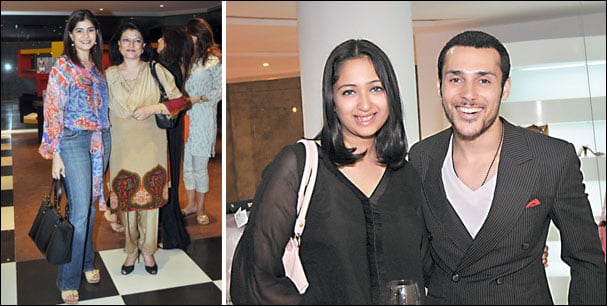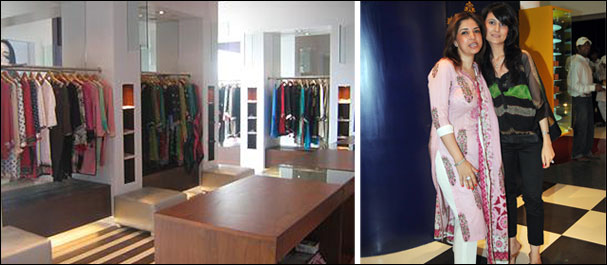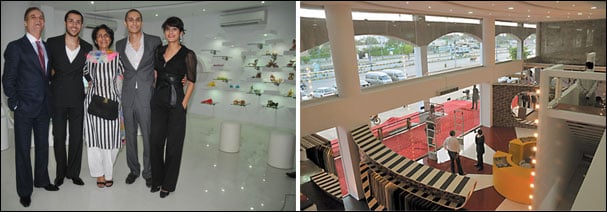|
|
| |
instep
analysis
Introducing Faisalabad:
Fashion's new frontier
Ammar Belal, on a massive expansion spree of his brand, opened
the first luxury fashion flagship store in Faisalabad this summer.
With it, the potential of a huge new market for fashion unveiled.
And as one traveled down the Motorway to make it to the opening,
the idea that emerged in the mind was, can there be a red carpet
long enough to link fashion to Faisalabad?
By Aamna Haider Isani
|
| |
 |
| |
|
The path has
already been paved.
Faisalabad is the third largest city of Pakistan. Relevant to fashion
is the fact that it inhabits over 300 textile mills and houses ninety
percent of neighboring Chiniot's affluent population. As one socialite
at the opening said, "We have the money and we know how to
spend it," while another pointed out, "Pakistani designers
have been thriving on Chinioti money for decades; they should open
stores here now."
The city does boast of a lot of Pakistan's rich and as one speaks
to more of them, one senses the urge of recognition that nags them
now. There is a need for acknowledgement of the buying power they
have, there is an urgency to be famous as well as rich, which they
already are.
The dusty city, however, does not reflect much of the grandeur that
one tends to associate with its value. Huge billboards looming over
the main road read 'Welcome to the city of Textiles' but there isn't
much in the landscape of the city suggestive of its industrial or
financial strength. It gives a very dull and disheveled appearance,
with none of the glitz and glamour that might suggest at its potential.
But then again, many visitors to Karachi have compared Pakistan's
metropolis to a garbage dump - totally inhabitable and inhospitable.
Faisalabad - the 'Cottonopolis', often compared to Manchester for
its industrial strength - has a lot to offer in terms of buying
power, stability and security. The potential is immense and it was
evident at the launch of Ammar Belal's flagship store.
|
|
|
 |
| |
Advertisements
of brand Ammar Belal lined the roads that led to the Do Burj Mall,
where the store was opening, and they were a welcome sight no doubt.
There stood the man who models his own brand, in an extremely well
structured suit, looking like something out of GQ and somewhat out
of place amidst the plethora of shallu clad vendors and drivers who
swarmed the streets. Equally striking was the vision of Aaminah Haq,
looking beautifully submerged in a pool of water carrying an Ammar
Belal bag. And the two were everywhere staring down at you from hoardings
all along Jarranwala Road, so ostensibly bringing the image of fashion
to the city that is so hungry for it.
The two storey store on the front face of the Do Burj Mall was equally
impressive. Flanked by a giant image from Tapu Javeri's brilliant
campaign, the place recreated Vegas. And dressed to the nines in high
heels and diamonds galore, Faisalabad's high society flocked to it.
They loved the fact that a premium brand designer had actually taken
them seriously enough to open here and have a very fashionable opening
- red carpet and media et al - for their benefit.
One has heard stories of Faisalabadi women - back in the sixties,
being fashionable; they were the elite of Punjab. They were good looking
and well bred, settling in this city then called Lyallpur. And even
that day at the opening, while one presumed to see and meet the underexposed
populace of a small town, the women of Faisalabad impressed.
In walked girls in skinny jeans and modern tops - O' Level students
- choosing what they liked and then calling daddy to pay the bill.
The older women came with their French manicures and solitaires both
boasting a high maintenance lifestyle. And even when they spoke, they
spoke well. They mingled with the Belal family, as Aaminah (Haq) charmed
them into the history of a 25,000 rupee bag and Khwaja Belal (Ammar's
father) explained the different kinds of exotic leathers that were
used in the footwear. These captivating demonstrations lasted the
evening and they worked wonders around the customers who came and
bought like there was no tomorrow. In its litmus test for reacting
to a luxury brand, Faisalabad had passed with flying colours.
And it's easy to understand why. Faisalabad is a city easily demarcated
between the upper class and the lower class. There is no middle class,
the service sector having migrated to Lahore or Karachi for better
job options. And the key to fashion's success lies in the hands of
the wealthy upper class.
But for Faisalabad to become the next destination for fashion, a couple
of things need to happen. One, fashion brands need to establish themselves
in the city.
Ammar Belal opened in July, the inauguration was "insane"
in terms of business, he adds, "It was a moment that will go
down in history for being the first brand of luxury menswear to open
in Faisalabad." Hot on the heels of success followed Karma. |
| |
 |
| |
"Karma
Pink is doing very well," confirms Maheen Kardar Ali. "It's
one of the best Karma Pink stores and we didn't have a launch because
we opened in Ramazan; the city is a bit conservative and we wanted
to respect that. But we will now because I feel Faisalabad wants that
glamour and the razzmatazz. But business is doing well."
Would she be thinking of setting up a production base in Faisalabad?
"Not for Karma," Maheen replies, "but definitely for
Karma Nation, which we plan to launch net year. That will be mass
produced ready to wear, with a costing varying between 100 and 3000
rupees. We will outsource in Faisalabad for that as these people have
the experience and the infrastructure. Plus, we're already collaborating
with them for Karma Fabric."
The opening up of stores will lead to fashion shows and Faisalabad
specific branding, which will inevitably lead to an expansion of the
fashion industry as well as the development of the city itself.
Two, the grand merger between textiles and fashion needs to be geared
towards ready to wear. Knitwear has already accomplished that with
retail brands like Crossroads and Stoneage. As Ammar puts it, "These
brands are only a few years old. Give them a couple more years and
they'll be Pakistan's equivalent to Next and Mango." Similarly,
textile mill owners are already weighing the options of joining hands
with fashion designers for exclusive lawn collections.
"The possibilities are immense," enthuses Haseeb Ahmed,
owner of Sitara Textiles. "Teaming up with designers is huge
value addition for us. And it benefits the designers too. We worked
with Kanwal of Design Zone last year as well as Vaneeza Ahmad and
I know that the sales were tremendous. As far as ready to wear clothing
goes, the market is ready for an evolution. All it needs is a good
product, which is accessible and affordable. Junaid Jamshed is successful
because he provides a shalwar kameez suit for 1200 rupees. Amir Adnan
took longer to settle in. You have to understand that the market here
is not only brand conscious but also quality conscious." |
| |
 |
| |
The
women feel that money is no object as long as the product is right.
This is a class of women born into or married into industrial families.
They do not work yet theyare busy, planning their days around coffee
mornings, brunches, lunches, tea parties, committee parties and dinners.
It's the force of the begum brigade. And as their husbands discuss
the growth of the textile industry, the ladies compare notes on who's
wearing what. Fashion labels have to be the most elite and repeating
an outfit is unthinkable. In this rat race, each one of them easily
spends up to 1.5 lakhs a month on clothes making Faisalabad designer's
paradise.
"There definitely is a market for fashion in Faisalabad,"
comments Nazia Nazir, a Faisalabad based socialite who is married
into Masood Textiles and is an avid fashion buyer. "The market
may not be huge but then luxury fashion doesn't look at the masses
anyway. Women from Faisalabad have been going to Karachi for ages
- they love shopping at Rizwan Beyg or Sana Safinaz. Something like
The Boulevard would work here though I have to say that I've never
liked anything there. I think brand awareness is huge in Faisalabad.
Sana Safinaz, Rizwan Beyg, Faiza Samee and Bunto Kazmi are favourites;
next come Karma and HSY. But Maria B opened here and didn't do well
at all. You can't just bring in anything and take women here for a
ride. They know their
fashion."
"I'm a fashion lover and I wish brands would open here and make
shopping a little easier for us," says Erum Ahmed, who is married
to the owner of Kamal Spinning and even helps the business as Design
Director. "It's a big market and the crème of Pakistan
is living here. Here are people who travel a lot; they have second
homes in Dubai and know their brands. I usually shop at Sana Safinaz,
and take one day trips to Karachi to pick up joras. I also wear Jannat's
clothes (the Faisalabad based designer duo Jannat & Sadaf). My
daughter shops at 10 Q in Lahore and loves Zara Shahjehan. We do feel
it would be extremely convenient if designers would open outlets here."
She adds that the industry that supports fashion - style and beauty
- needs to be improved here too. "There aren't enough salons
here though women only need a reason to dress up. Nabila is a good
friend of mine and I have suggested that she needs to make Faisalabad
her next stop."
Fashion opening up in Faisalabad will also give the industry another
advantage. Most of our designers have the skill to operate without
the production capacity. That production capacity is what Faisalabad
can easily provide. It is a relatively safe haven, unobstructed by
the power failures and security threats or high expenses that weigh
down Lahore and Karachi.
"Lahore is experiencing market saturation," says Shahid
Arshad, owner Crescent Mills. "Consequently a lot of people are
inclined to come to Faisalabad. Development is slow here and the textile
industry has suffered a set back due to price hikes and tax laws but
things are still happening. The cost of doing business here is not
half bad. As for production of fashion labels, there are already many
textile as well as stitching units here. I do think a merger is possible."
The Government of Punjab definitely is thinking along those lines
as the first Faisalabad Institute of Textile and Fashion Design was
established in 2004 for furthering this agenda. A merger is very much
on the cards and the key lies is making links between fashion and
Faisalabad. Ammar Belal is already employing these students to help
stylize men at his Faisalabad store. This consultation service is
something he provides in each of his stores: sales staff trained and
equipped to advise customers on how to plan their wardrobes fashionably.
And in Faisalabad he is employing fashion students.
So far Faisalabad is a virgin market for fashion. People don't have
retail options despite having immense buying power. The market is
very definitive - a Sana Safinaz, Faiza Samee or Rizwan Beyg would
cater to the decadent clientele whereas a Sonya Battla or Maheen Karim
wouldn't - but the market certainly does promise to be more lucrative
than Islamabad, for example.
The potential of the market has also encouraged women like Jannat
and Sadaf - the design duo from Faisalabad who have successfully been
exhibiting in Karachi and have become local favourites in the city
too - to take up the business. With the initiation of a fashion school
and textile owners eager to employ these fashion graduates it also
seems that they are gradually gearing towards changing the way textiles
have always been done in Pakistan; that also means broadening the
scope of ready to wear. Under the circumstances, Faisalabad does seem
a natural stepping stone in the expansion of fashion. It's a city
waiting to be explored. |
| |
|

